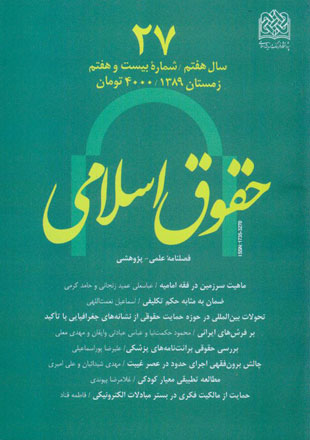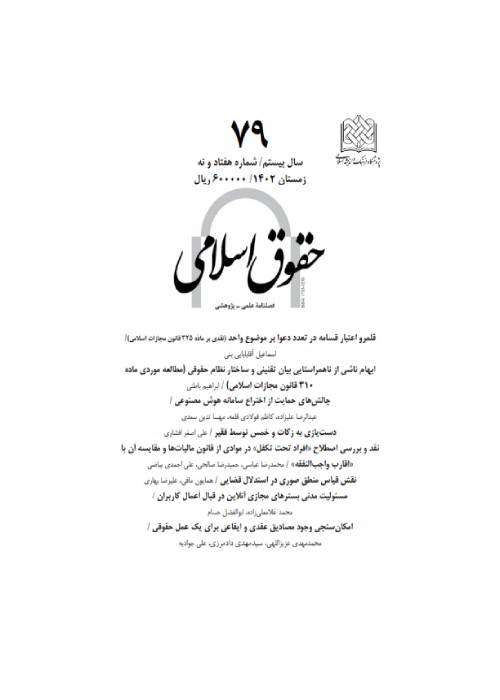فهرست مطالب

فصلنامه حقوق اسلامی
سال هفتم شماره 4 (پیاپی 27، زمستان 1389)
- 208 صفحه، بهای روی جلد: 40,000ريال
- تاریخ انتشار: 1389/11/12
- تعداد عناوین: 7
-
-
صفحه 7
-
صفحه 29
-
صفحه 83
-
صفحه 139
-
Page 7
Definition of Dar al-Islam as the scope of the Islamic land is a point of debate between jurists. Absence of clear standards for this point has added to the complexity of the issue. Emergence of concepts such as State, country, nation and the like necessitates a concrete definition for borders of the Islamic land. There are two views popular among jurists according to one of them borders of the Islamic land are the same as its geographical borders; and based on the other, they are ideological ones.Standards for realization of Dar al-Islam may be summarized in three features: Islamic rules may be executed, Muslims are majority of population, and Muslims may establish their government. That Muslim may establish their government seems to be the most rigorous standard which can be, in the present time, used to specify the Dar al-Islam.
Keywords: Dar al Islam, Dar al Kufr, Muslim government, implementation of Islamic rules, land -
Page 29In Shii jurisprudence, contractual guarantee means a contract according to which the third party (guarantor), based on the agreement of the conventee, accepts a debt of the debtor. The main impact of this contract is that the guarantor comes under debt and the main debtor becomesclean of obligations. Thus, acceptance of guarantee in important and popular cases in which, before conclusion of a contract, there is no obligation for the debtor to be transferred to the guarantor, has been objected.The present article, while discussing such cases, shows: firstly, though in the Shii jurisprudence, guarantee in its main and popular sense produces a situational decree (transfer of debt from the debtor to the guarantor); there is no objection to acceptance of guarantee as a contract whose main effect is an independent mandatory decree (i.e. obligation to payment); and it is covered by generalities of fulfillment of obligation.Secondly, in many cases wherein guarantee as a situational decree is objected, it may be accepted as a mandatory one. If this point is proved, it may be taken as a solution for some problems concerning guarantee in Civil and Trade Law; and the way will be paved for acceptance of somedifficult cases.Keywords: guarantee, situational decree, mandatory decree, debt, obligation, guarantee of what is not necessary
-
Page 57International protection of Iranian carpets based on the institution of geographical symbols and icons is of an undeniable impact on occupationand non-petroleum export. International protection of geographical symbols and icons began from treaties for protection of patent rights and in particular Paris Convention (approved in 1884), and when its special treaties (i.e. Madrid Agreement 1891 and, later, Lisbon Agreement 1958) were approved, it was completed. Nevertheless, because of some legal gaps, the TRIPS Agreement brought under protection geographical symbols and icons in a more complete way, while covering all instances of intellectual property and determining administrative mechanisms as well as powerful sanctions.Complete and effective protection of Iranian carpets, at first, requires us to register them in accord to the Lisbon Agreement, and then, to accept and implement rules and sanctions of TRIPS; and, this can fulfill our country's needs concerning protection of carpets in an allinclusiveway. After defining and discussing geographical symbols, in the present writing, international conventions and agreements in this concern will be studied, and their weak and strong points will be mentioned; and, then, some comments in this regard will be introduced.Keywords: Iranian carpets, geographical symbols, Paris Convention, Madrid Agreement, Lisbon Agreement, TRIPS Agreement
-
Page 83Nowadays, it is popular in medical practice that when a patient refers to a physician to be cured (in particular if it requires surgical operations), the patient or her/his relatives have to sign a formal letter of clearance and then the physician will begin to treat the patient; for, except in emergency cases, such letter of clearance is the proficient physician's only means to be cleared of responsibilities; and, evidently, the physician will not ignore it. Nevertheless, medical centers and hospitals do not suffice to take only such letters of clearance; but rather, they take a letter of consent as well which clears the physician of penal responsibility while the letter of clearance clears her/him of civil responsibility. Thus, it should be found that what the value of condition of clearance or letter of clearance is. May one believe in its authenticity and correctness, and may it be effective? Does taking a letter of clearance mean that a proficient physician is cleared of civil and/or penal responsibility? Does it mean that she/he is not responsible at all? Finally is it sufficient to merely take a letter of clearance from the patient or her/his relatives and no letter ofconsent is needed?Keywords: condition of clearance_responsibility of a proficient physician_authenticity of clearance_damages resulted from treatment
-
Page 107Implementation of fixed religious punishments in the present time is one of the challenging issues. In addition to intra-juridical challenges concerning those who implement fixed religious punishments,implementation of such punishments faces extra-juridical challenges as well. Because of these challenges, two doctrines have been introduced:implementation and abandonment [of fixed religious punishments].Based on permanence of Islamic ordinances and the fact that ordinances have been introduced on the basis of interests and disinterests which are in accord to man's innate nature, some scholars are of the opinion that fixed religious punishments should be implemented in the Time of Occultation. On the contrary, some others are of the opinion that, since fixed religious punishments are temporal and mean to produce intimidation and since they are in conflict with findings of criminology,Islamic penal ordinances and in particular those concerning fixed religious punishments should be abandoned. Studying extra-juridical challenges, the present article clarifies that such challenges are not so strong that fixed religious punishment as a primary ordinance may be abandoned based on them.Keywords: fixed religious punishments, the Time of Occultation, temporality, extra, juridical
-
Page 139One of the a priori and important issues in the field of Children rights is study of childhood standard: when childhood begins and when it comes to an end and a child may be considered as an adult one. Concerning beginning of childhood, three views have been introduced and discussed. This point has been paid attention to in Iranian Law, international legal documents, and laws of some other countries. The end of childhood has been discussed from various perspectives as well. There are three views concerning beginning of childhood: according to the first one, childhood begins at birth; in the second approach, it begins at semen coagulation in mother's womb. Finally, according to the third view, when embryo grows sufficiently to survive if born, childhood begins. According to the international documents and laws of many countries of the world, childhood ends when one is 18 years old; in some other countries, the maximum age for childhood is 19 or 21 years. According to the Iranian laws, religious maturity is the standard of the end of childhood; though,in some rules, this standard is different.Keywords: childhood, childhood standard, infancy, beginning of childhood, the end of childhood, children rights
-
Page 169In the contemporary digital world, protection of the intellectual property rights which is done based on various kinds of advanced technologies (and to put it more accurately, by information and communication technologies) is one of the most important challenges faced by the contemporary legal systems.In the contemporary technological world, in the context of advances resulted from sciences and technologies, items which are protected by laws concerning protection of intellectual properties may be saved,copied, transferred, and changed in a fraction of a second. This has forced most legal systems to formulate consistent protective rules to protect intellectual property rights in the context of electronic exchanges. New treaties of the World Intellectual Property Organization have been formulated according to the instructions provided by the Parliament and Council of Ministers of the European Union to comply with advances made in the technological field and complete Bern and Paris treaties. The article 62 of the Electronic Commerce Act of Iran has been passed to face this very challenge. The present article aims to study mechanisms invented to protect such rights at domestic and international levels.Keywords: intellectual property, computer software, hyperspace, copy right, database


